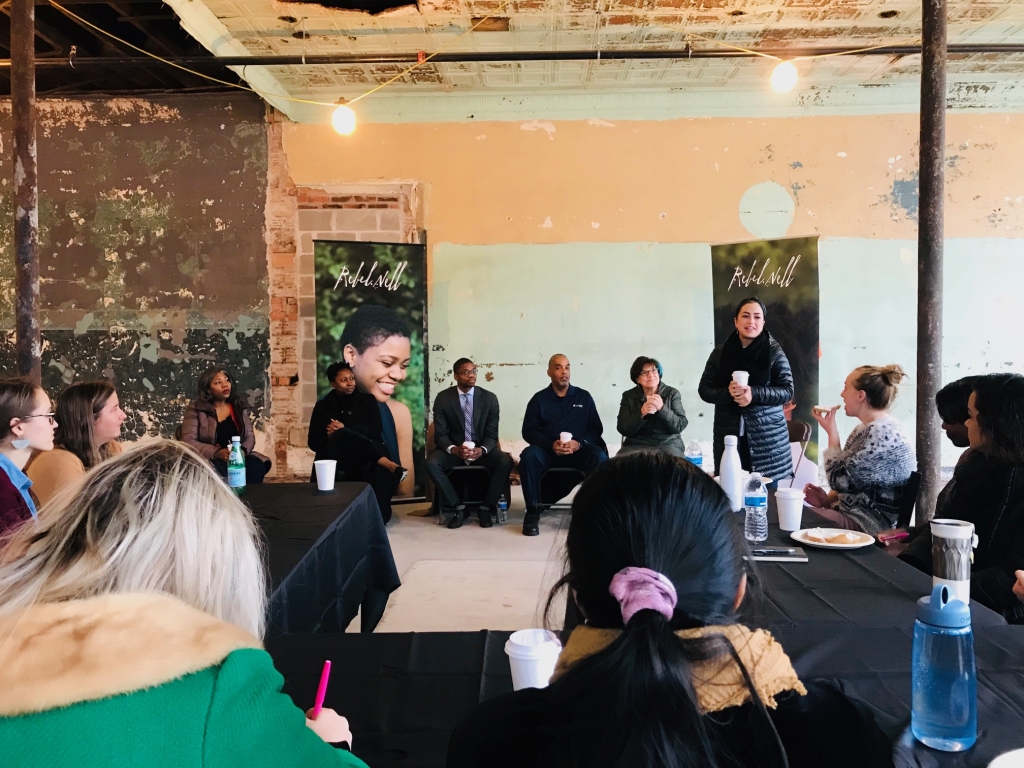Working with Rebel Nell’s nonprofit arm T.E.A. has been enlightening over the last few months as we’ve learned more about their goal of Teaching, Empowering, and Achieving women within Detroit. Working in three teams, we partnered with T.E.A. to look at this question: How might we effectively teach the foundations of financial education to improve quality of life for Detroit women living in poverty?
The Growth team specifically looked at “How might we expand our financial education programs (Money Relationships) in order to create more financial stability among Detroit women, specifically those living in poverty?” Through the empathy interviews we conducted, we gained key insights on the importance of trust, transparency and creating meaningful connections when trying to expand a program like Money Relationships. We learned a lot about barriers, from larger societal issues that cause poverty and economic instability, to smaller personal barriers like childcare and transportation. The perspectives we heard were instrumental as our team worked on the deliverables. When creating the partner packet, a document that explains and promotes the Money Relationships program, we kept in mind these perspectives when suggesting that there are multiple options for how an organization may get involved. A partner can act as a host by providing a space for the class, a sponsor by providing resources, or an organization already interacting with women who would benefit from participation in Money Relationships. Additionally, we recommended a marketing strategy that focuses on building a network of participants and incentivizing word-of-mouth as a key growth strategy. We were inspired by one of the Rebel Nell employees who shared her story of financial instability and said, “I challenge people to step up, tell their story, take on that leadership role.” We also recommend that those who have experienced the program can do effective recruitment and be financially compensated for supporting recruiting efforts. We hope that these recommendations and strategies help T.E.A. effectively grow Money Relationships.
Our second team of Fellows, the Learning Team, met with a single mother living in a homeless shelter, who became one of the most helpful individuals in shaping deliverables. We worked to answer the question “How might we shape a relevant learning experience so that our participants are fully engaged?” Our interviewee proposed the concept of a planner to base the Money Relationships class around because she felt it would add stability, organization, and something tangible for women to walk away with. From this conversation and what other stakeholders shared, we designed and built a binder. This Money Relationships binder includes activities, resources, goal setting, and journal prompts to guide the women as they embark on their financial education journey. Other stakeholders also shared insights for what they hoped for in the Money Relationships class that perfectly aligned with the case studies and successful models we found. A desire to learn in small chunks of time, built around the schedules of busy moms. A desire to learn in a cohort model with other women who have a similar relationship with money and finances. All of the women we spoke with shared a negative connotation with money and financial literacy. As they worked toward changing their relationship with money, positivity and personal empowerment would be the key to keeping them fully engaged. Through the design thinking process and the insights of the women we interviewed, we recommended several enhancements that allow for a fully developed educational plan to engage women holistically as they learn the Money Relationships curriculum.
After growing outreach and implementing an improved learning strategy for the Money Relationships program, another important component was to evaluate and measure the success of the program overall. The Feedback and Evaluation team was tasked with defining the difference between feedback and evaluation, developing key metrics to assess them, and recommending approaches to keep individuals accountable towards their success into the future. Feedback was interpreted as understanding how the program met the needs of participants, and evaluation was defined as assessing the impact of the program on participants in the weeks following the course. The third team of Fellows created pre- and post-workshop questionnaires to gauge feedback on the workshop itself, as well as scheduled follow up check-ins to evaluate after the course. One of our stakeholders proposed a unique way to rate the success of the program by quantifying how many people would recommend the program to someone else. This became a key component we measured in our surveys and check-ins because we learned that by teaching the program in the correct way for participants, they would then share with people they knew which would continue to expand the network of financially like-minded individuals. Having a network would provide accountability into the future, in addition to resources like biweekly check-ins and accountability calendars to track progress over time. These methods of feedback and evaluation ensured that the Money Relationships course valued the success of the individual over the success of the program itself.
The elements necessary to effectively teach financial education centers around growth, learning, and feedback and evaluation. T.E.A’s program provides this foundation by supporting Detroit women living in poverty, empowering them to understand successful finances, and helping them achieve their financial goals. We were honored to work on this project alongwide T.E.A and their community, and we look forward to seeing the next steps of implementation for the Money Relationships program.

